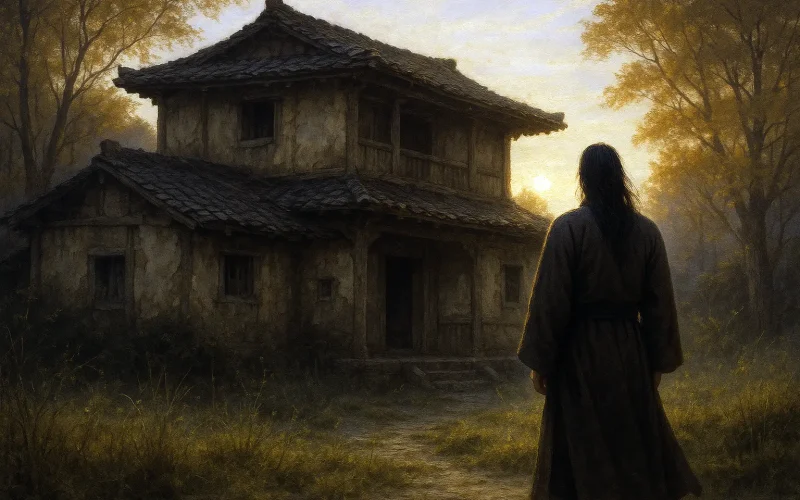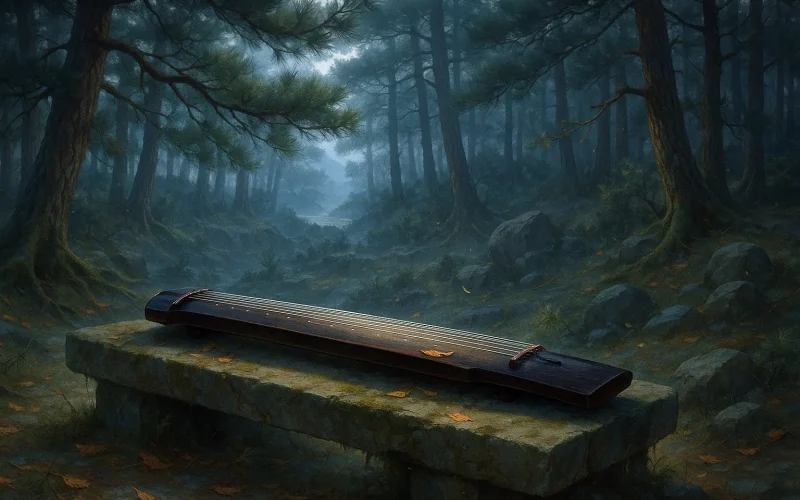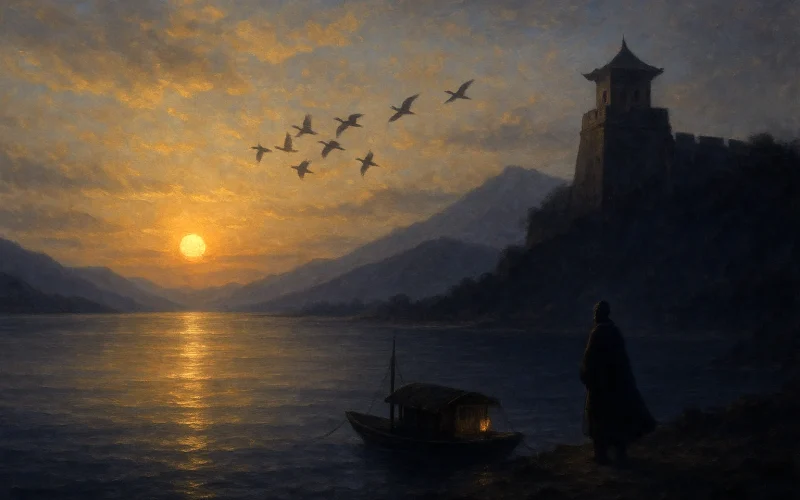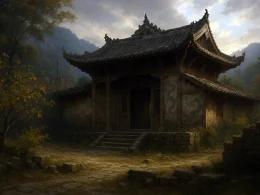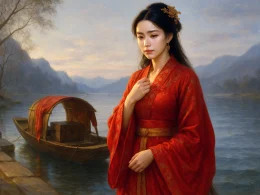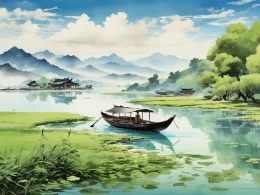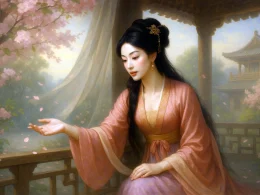Here, where you spent your three years' exile,
To be mourned in Chu ten thousand years,
Can I trace your footprint in the autumn grass --
Or only slanting sunlight through the bleak woods?
If even good Emperor Wen was cold-hearted,
Could you hope that the dull river Xiang would understand you,
These desolate waters, these taciturn mountains,
When you came, like me, so far away?
Original Poem
「长沙过贾谊宅」
刘长卿
三年谪宦此栖迟, 万古惟留楚客悲。
秋草独寻人去后, 寒林空见日斜时。
汉文有道恩犹薄, 湘水无情吊岂知?
寂寂江山摇落处, 怜君何事到天涯?
Interpretation
Composed during Emperor Daizong's Dali era (circa 766 AD), this poem was written when Liu Changqing, having been demoted again for outspokenness, passed through Changsha en route to his new post in Yuezhou. Changsha was where the Han statesman Jia Yi had been exiled centuries earlier. Visiting Jia's former residence alone at night, the poet was deeply moved by the parallels between their fates, pouring his sorrow into these verses that resonate with timeless grief.
First Couplet: "三年谪宦此栖迟,万古惟留楚客悲。"
Sān nián zhé huàn cǐ qī chí, wàn gǔ wéi liú Chǔ kè bēi.
Three years exiled here he did remain / Leaving eternal Chu exile's pain
The opening establishes historical continuity between Jia Yi's banishment and the poet's own. "This" (此) anchors the scene in Changsha, while "Chu exile's pain" (楚客悲) becomes a bridge connecting ancient and contemporary suffering, setting the poem's melancholic tone.
Second Couplet: "秋草独寻人去后,寒林空见日斜时。"
Qiū cǎo dú xún rén qù hòu, hán lín kōng jiàn rì xié shí.
Through autumn grasses I seek where he withdrew / In barren woods, only slanting sun comes into view
The desolate imagery of overgrown grasses and wintry woods under declining sunlight mirrors the poet's solitary pilgrimage. "Alone seeking" (独寻) and "only seeing" (空见) underscore both physical solitude and spiritual disappointment in this failed communion across time.
Third Couplet: "汉文有道恩犹薄,湘水无情吊岂知?"
Hàn wén yǒu dào ēn yóu bó, Xiāng shuǐ wú qíng diào qǐ zhī?
Though Emperor Wen ruled with light / His favor still proved slight / Can heartless Xiang River know / The grief I bring its flow?
The couplet's bitter wisdom suggests even enlightened rulers (like Emperor Wen) fail true talent. The rhetorical question to the Xiang River—associated with Qu Yuan's drowning—doubles as protest against history's indifference to injustice, while implicitly comparing the poet's fate to two wronged predecessors.
Fourth Couplet: "寂寂江山摇落处,怜君何事到天涯?"
Jì jì jiāngshān yáoluò chù, lián jūn hé shì dào tiānyá?
In rivershills' silent decay / Why must the worthy end this way?
The concluding vision of a decaying landscape universalizes individual suffering into cosmic injustice. "Why must" (何事) transforms personal lament into philosophical inquiry about talent's eternal marginalization, making the ancient exile's fate a mirror for all wronged intellectuals.
Holistic Appreciation
The poem constructs a palimpsest of historical grief, where Jia Yi's Han-era exile becomes legible through Tang dynasty ruins. Moving from temporal framing (I), through physical exploration (II), to philosophical protest (III-IV), it progresses from concrete observation to metaphysical questioning. The autumnal imagery—grasses, slanting light, falling leaves—simultaneously marks seasonal decline and dynastic decay, while the Xiang River's "heartlessness" indicts cosmic indifference to human virtue.
Artistic Merits
- Historical Layering: Jia Yi's biography becomes prism for contemporary discontent
- Landscape Allegory: Decaying nature symbolizes political and moral decline
- Interrogative Force: Rhetorical questions amplify unanswerable injustice
- Sensory Syntax: Visual (slanting sun), tactile (cold woods), auditory (silent decay) elements merge
Insights
This Tang masterpiece transcends its immediate context to speak about intellectual marginalization across ages. Liu's identification with Jia Yi—who became China's archetypal wronged genius—reveals how historical memory serves as both wound and weapon for dissident voices. The poem's enduring power lies in its transformation of personal grievance into eternal question: why do civilizations persistently reject their brightest minds? For modern readers, it resonates with contemporary experiences of talented outsiders in bureaucratic systems worldwide.
About the poet
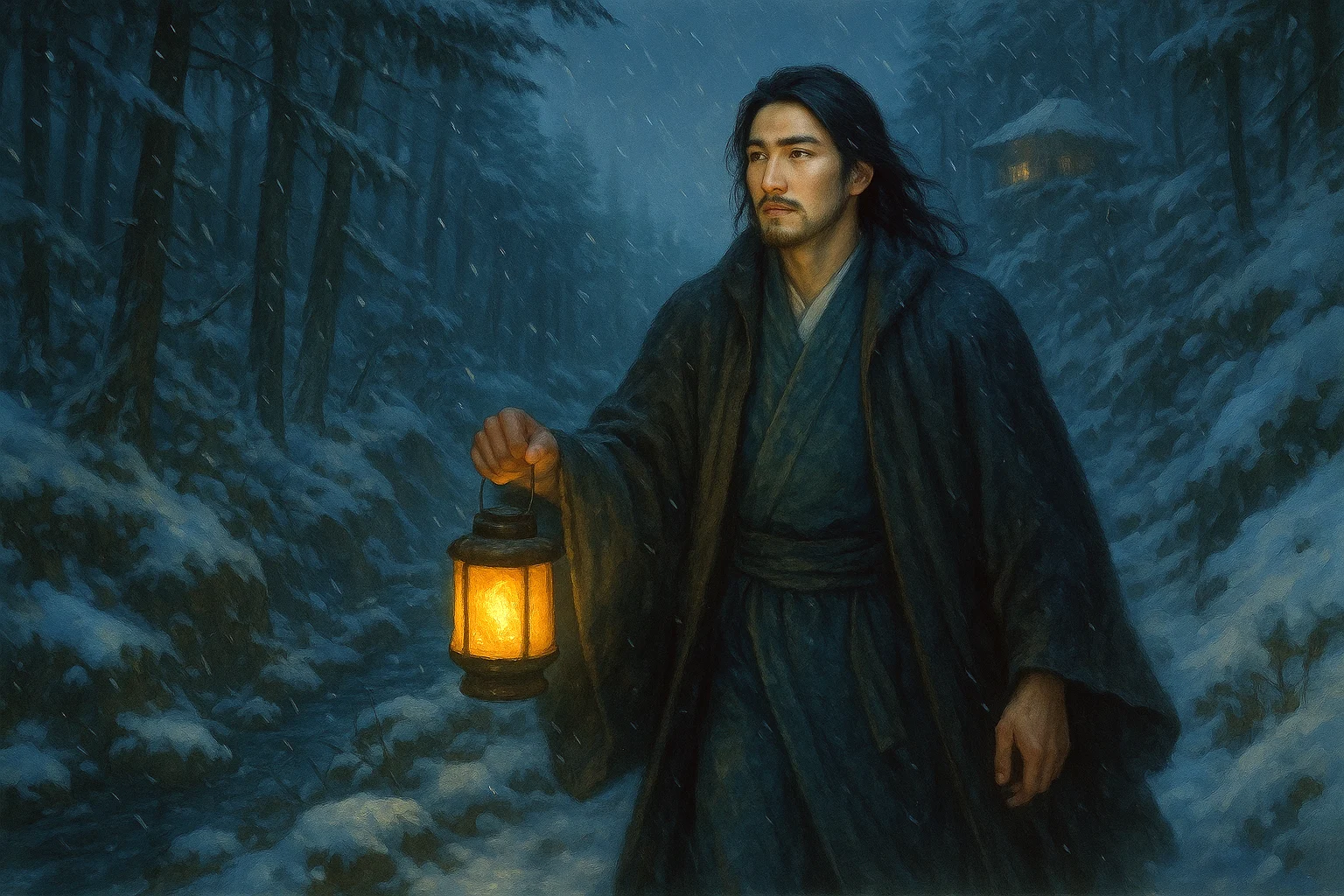
Liu Zhangqing (刘长卿) was a native of Xian County, Hebei Province. He studied at Mt. Songshan when he was young, and later moved to Jiangxi, where he received his bachelor's degree in 733 A.D. He also belonged to the Wang and Meng school of poetry. His poems belonged to the school of Wang and Meng, and he was most famous for his five-character poems, and was also most conceited, once thinking that he was "the Great Wall of five-character poems", which meant that no one could surpass him.
Poem translator:
Kiang Kanghu






